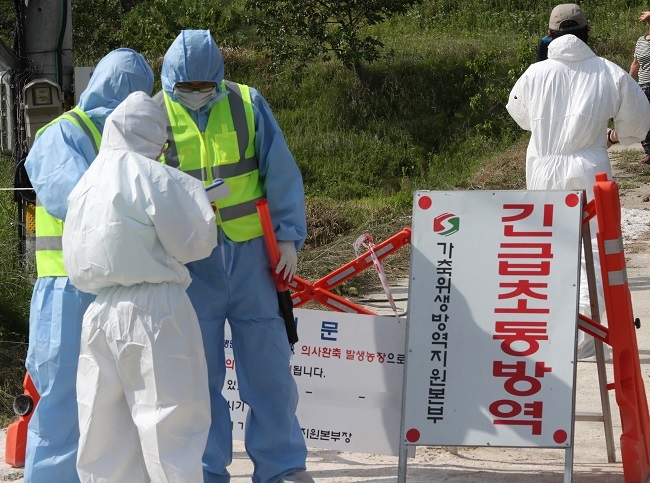Signs of a resurgence of bird flu are rapidly spreading across South Korea, triggering concerns over yet another possible round of the massive slaughter of poultry and ensuing hikes in egg prices.
The Ministry of Agriculture, Food and Rural Affairs confirmed Monday that small flocks of farm chickens on the southern island of Jeju have tested positive for the highly pathogenic H5N8 virus. The agency also said it will raise the bird flu alert to the highest level.
The announcement came in response to a report by an owner of a small backyard farm Friday after eight of his chickens died. All sales of live poultry here are also banned until further notice starting Monday.
The Ministry of Agriculture, Food and Rural Affairs confirmed Monday that small flocks of farm chickens on the southern island of Jeju have tested positive for the highly pathogenic H5N8 virus. The agency also said it will raise the bird flu alert to the highest level.
The announcement came in response to a report by an owner of a small backyard farm Friday after eight of his chickens died. All sales of live poultry here are also banned until further notice starting Monday.

The government is taking prompt steps to contain the outbreak at an early stage. It had faced criticism over its tardy response that contributed to the worst-ever outbreak last year. Until health authorities closed the last case in early April, 37.8 million farm birds, or a fifth of the total poultry population here, were culled. With then-President Park Geun-hye’s duties suspended and the nation in political turmoil, the administration had failed to move quickly to stabilize the situation.
“Make sure to stop bird flu with preventive measures and remain on high alert until (the spread) is over,” President Moon Jae said at a meeting with top secretaries and advisers, instructing Prime Minister Lee Nak-yon to oversee the issue.
At least 20 farms in six cities and provinces are under close watch, according to ministry officials. Over 30,000 farm birds near the infected farms were slaughtered as a precaution.
Amid spiraling public concern, the government and officials at the Korea Centers for Disease Control and Prevention said Monday that there is very low risk that H5N8 and H5N6, common strains of bird flu, will infect humans.
It is yet unclear what triggered the comeback of the virus in Gunsan, as the country had seen no cases since two months ago. The government announced the de facto end of the spread of bird flu by lowering the alert level to normal Thursday -- just two days before it raised the level back again.
In the wake of the latest discovery, critics argue that a full investigation should be carried out to determine the source of the infection, as well as to strengthen prevention measures.
“More investigation is needed in terms of the source of the infection, but it’s highly likely that the recent outbreak is attributed to viruses that have remained inside (infected farm birds),” Kim Jae-hong, a professor of veterinary medicine at Seoul National University, told The Korea Herald.
The infected areas include Gunsan, the country’s southwestern region, which had possibly shipped out infected chickens and ducks to more farms including Paju, Gyeonggi, and Yangsan, and possibly to more areas not reported yet.
Authorities are working to identify those areas to limit the spread of the virus.
Kim added that the government’s “hasty decision” to lower the alert level last week was partly to blame for the re-emergence of bird flu, with many unauthorized backyard farms in individual households distributing poultry from and to local farmers.
The lack of preventive measures for AI, despite its outbreak being almost an annual event since 2003, is another issue that should be addressed, critics say.
“Our prevention system relies too much on farmers’ reports to the authority with insufficient measures to detect the course of the virus in advance,” Seo Sang-heui, a veterinary medicine professor at Chungnam National University, said in an interview with a local news outlet.
By Bak Se-hwan (sh@heraldcorp.com)




![[Herald Interview] 'Amid aging population, Korea to invite more young professionals from overseas'](http://res.heraldm.com/phpwas/restmb_idxmake.php?idx=644&simg=/content/image/2024/04/24/20240424050844_0.jpg&u=20240424200058)











![[KH Explains] Korean shipbuilding stocks rally: Real growth or bubble?](http://res.heraldm.com/phpwas/restmb_idxmake.php?idx=652&simg=/content/image/2024/04/25/20240425050656_0.jpg&u=)

